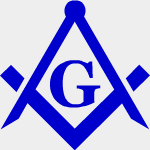
Freemasonry is often defined as a system of morality, veiled in allegory and illustrated by symbols. It is the oldest and largest fraternal order on the earth, and has in modern times, as well as in times of old, been a popular subject evoked in works of fiction and conspiracy theories. The aim of Masonry is to take good men and make them better. This aim is accomplished by teaching men what is expected of them as a member of The Craft by way of a special form of instruction using ancient rituals, which we call "degrees", which lay the candidate under solemn obligations, voluntarily assumed in the name of God, to perform those things required of them and abstain from those things prohibited by Masonry.
Because our obligations are taken in the name of God a man must possess belief in a Supreme Being in order to gain admission into the fraternity, but beyond this simple requirement Masonry places no further restriction or demand upon the religious beliefs of the individual candidate: His religion is his own business, however, Masonry does teach of the Fatherhood of God, the Brotherhood of Man, and the Immortality of the Soul. Masonry is not a religion, nor should it ever become the substitute for religion, but it is often said to be the handmaiden of religion, and encourages the individual Mason to be active in his faith and live by the Volume of Sacred Law (Scriptures such as the Holy Bible, Koran, or other holy writings) of his own faith.
Many of our principal symbols derive from the working tools of the Operative Stone Masons guilds of the middle ages, but to the modern Speculative Freemason they are used to teach us moral lessons, for example: The common gavel is an instrument used by operative Masons to break off the rough and superfluous parts of stones, the better to fit them for the builder's use. But we, as Free and Accepted Masons, are taught to make use of it for the more noble and glorious purpose of divesting our hearts and consciences of all the vices and superfluities of life: thereby fitting our minds as living stones for that spiritual building, that house not made with hands, eternal in the heavens.
The chief tenets of Masonry are Brotherly Love, Relief, and Truth, and a Mason is taught to practice the four cardinal virtues: Temperence, Fortitude, Prudence, and Justice. Masons come from all walks of life, and Masonic lodges exist in nearly every country of the world.
Candidates for Masonry must be free born, come under the tongue of good report, and be well recommended. The "free born" requirement is a relic from the days when slavery was common. It is important for a Mason to be free, because he must be able to make decisions for himself in order to be placed under the obligations of the fraternity. Additionally, a man must petition for the Degrees of Masonry by his own free will in order to be considered for membership: No one should ever be induced to become a Mason. If you are wondering why your friend, a member of the Lodge, has not asked you to join the fraternity, it is because that is not in the program: You must ask him, of your own free will, if you desire admission into the mysteries of our ancient and honorable order.